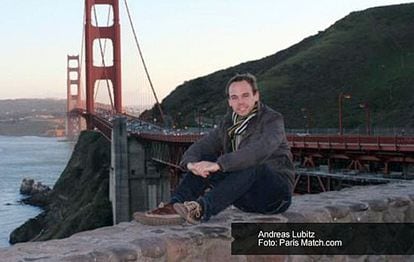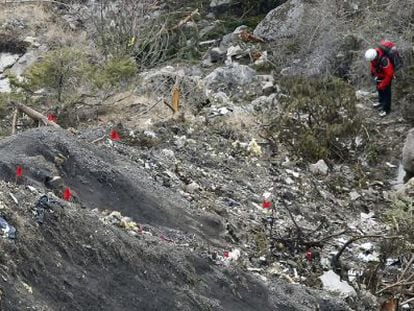“The copilot was intending to destroy the plane” — Alps crash prosecutor
Investigation chief says crew member deliberately began descent of the plane


The copilot of the plane that crashed in the French Alps on Tuesday deliberately began the descent of the Germanwings Airbus A320, and stopped the pilot from entering the cockpit until the aircraft smashed into a mountainside, killing the 150 people aboard. That is the explanation given for the causes of the incident by the prosecutor in Marseille in charge of investigating the case, Brice Robin.
The copilot was Andreas Lubitz. He was trained by Lufthansa, the parent company of Germanwings, who hired him in September 2013. He was 28 years old and came from Montabaur in Germany.
From the black box recordings, which are being analyzed by the authorities in France, investigators have deduced that he “was intending to destroy the plane,” explained Robin at a press conference held midday on Thursday. According to the recordings, he said, the copilot took control of the plane during the last 10 minutes of the recording. The noise of a chair being retracted and a door closing – presumably the pilot leaving the cockpit – is audible on the tapes.
The screams of the passengers could only be heard at the last moment”
The prosecutor also explained that the copilot was alive until the plane, which was flying from Barcelona to Düsseldorf, smashed into the ground. "His breathing sounds were normal,” he explained.
There was nothing “to suggest that we are dealing with a terrorist attack,” Robin explained.
The prosecutor also explained that on the recordings there are “calls from the captain, via the intercom, identifying himself” to the copilot in the cockpit, “but there is no response from the copilot.”
“The screams of the passengers could only be heard at the last moment,” the prosecutor added.
Robin explained that the last minutes of the recorded conversations between the captain and the copilot were characterized by “laconic, brief” responses from the latter. During that conversation the captain began to talk about the landing of the flight.
There was nothing “to suggest that we are dealing with a terrorist attack,” the prosecutor explained
One of the last sounds heard on the recordings was an alarm sounding in the cockpit, designed to alert the pilots of low altitude.
This version coincides with reports published earlier by The New York Times, which was told by sources close to the investigation that the pilot was outside the cockpit at the time of the crash and was not able to get back in, despite banging on the door. The German public prosecutor had also confirmed that one of the pilots was outside the cockpit at the time of the incident.
On Wednesday, the head of the BEA French air investigation office, Rémi Jouty, explained that the route taken by the aircraft was not compatible “with a plane controlled by the pilots.” Nor, he added, “with a plane controlled by the automatic pilot,” unless it was beginning its initial descent. As such, the maneuvers of the plane were only compatible with a deliberate accident.
According to French radio network Radio Europe 1, the pilot had flown with Lufthansa and Germanwings for the last 10 years, and was an experienced professional with more than 6,000 hours of flight time under his belt.
The pilot had flown with Lufthansa and Germanwings for the last 10 years, and was an experienced professional with more than 6,000 hours of flight time
The news today about the actions of the copilot has echoes of a plane crash in the United States in 1999, when an EgyptAir flight plunged into the sea with 217 people on board. One of the theories behind the incident was that the pilot had deliberately flown the plane into the water.
The disaster has also drawn attention to how security measures put into place after the 9/11 terrorist attacks can have unwanted consequences. After the hijacking of four passenger planes in 2001, all aircraft must now have lockable, reinforced cockpit doors. Airbus, for example, has its own system in place. If the occupants of the cockpit were to lose consciousness, the cockpit can still be opened from the outside using a pin code. But if one of the pilots locks the door from the inside, the cockpit is inaccessible.
The investigation into the Germanwings flight has already established that the copilot was able to lock the door to the cockpit and ignore the repeated calls from the pilot to let him in.











































